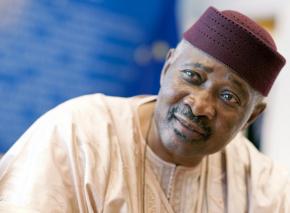Behind the coup in Mali
looks at the forces involved in a military coup against the president.
AMADOU TOUMANI Toure, the democratically elected president of the West African nation of Mali, was deposed in a military coup on March 21. Toure, known popularly as ATT, is being reportedly held by the military, but his whereabouts are unknown.
The leader of the coup, Capt. Amadou Haya Sanogo, a U.S.-trained mid-ranking officer, claims the goal of the coup-makers is to restore order in the north of Mali, where government troops have been involved in skirmishes with militias based in the region.
Sanogo and his National Committee for the Recovery of Democracy and Restoration of the State (CNRDR, by its French acronym) say that they want to properly equip the military and secure the country before allowing scheduled April 29 elections to go ahead and eventually handing power back to a civilian government.
Meanwhile, the militias have captured a military base just outside the northern city of Gao, and are reportedly advancing on another city, Kidal.
According to Al Jazeera, in the days following the coup, there was rampant looting in the capital of Bamako. Meantime, Mali has been suspended from membership in the African Union, and the European Union, World Bank and African Development Bank have suspended aid. The U.S. has cut off half of the $140 million in aid that it sends each year, according to the Washington Post.

Even though the contribution of the U.S. is meager, suspension of aid will cause a serious crisis for a country of 15 million people whose per capita income in 2010 was estimated at $691. The country's borders and airports have been closed, which will disrupt imports of petroleum, pharmaceuticals, machinery and spare parts. Mali uses the CFA franc currency under the control of the Economic Community of West African States, which has suspended Mali from membership, threatening a cut-off of the money supply.
According to the relief organization Oxfam, the Sahel region of Africa, which includes Mali, is already at risk for famine conditions unless humanitarian aid is increased. Malnutrition has already climbed to affect 15 percent of the population of the region, according to estimates.
THE MILITARY junta accuses deposed President Toure of not equipping the military properly to fight rebels in the northern part of Mali, reportedly centered among the Tuareg ethnic minority. The unrest in northern Mali began to receive international attention with the kidnappings and assassinations of more than a dozen Westerners in the area.
Two major questions are in dispute in the Western media. The first is whether the coup is genuinely limited to an attempt by Malian soldiers to equip themselves to fight the rebels--or whether it is possible pretext for stoking inter-ethnic violence. Gilles Yabi, the West Africa project director for the International Crisis Group, reported that there were "rumors of a military coup before the Tuareg rebellion began."
Most alarmingly, Think Africa Press reports that the new junta is arming irregular militias of different ethnic groups, in particular the Songhai, to fight the Tuaregs.
According to Voice of America, since the unrest began in the north, Tuareg citizens have been targeted in acts of violence throughout the country. So the threat is that the coup could escalate a new era of inter-ethnic conflict in a country where such strife has been less common, compared to other African nations.
The capital of Bamako and the southern half of Mali are sub-Saharan, and 80 percent of the ethnically diverse population speak Bambara. Agriculture, livestock and gold mining are the major sources of income. Northern Mali, on the other hand, is Saharan. The Tuareg, desert herders and traders, are the most prominent ethnic group.
There is a history of peaceful coexistence between the regions. However, the Tuaregs led several rebellions in the 1960s and 1990s to advocate for regional autonomy, government recognition of Tuareg culture, and more resources for the area. Once an integral part of a lucrative gold and salt trade and the African center for Islamic learning, northern Mali is now impoverished.
The second major question unresolved in the Western media is who the northern rebels are.
U.S. officials have raised concerns that they are led by al-Qaeda of the Islamic Maghreb (AQIM). However, there seems to be scant evidence for AQIM's involvement.
Instead, according to news reports, the leading role in the fighting in the north is being played by the secular-nationalist National Movement for the Liberation of Azawad, which wants to create a separate Tuareg state in the north. Another force involved in the north is Ansar Dine, an Islamist group whose reputed goal is to establish sharia law in Mali.
Some commentators have speculated that the latest skirmishes are being driven by former mercenaries of Libyan dictator Muammar el-Qaddafi, who may or may not be affiliated with MNLA or Ansar Dine. Since Qaddafi's overthrow, these soldiers who previously served the Libyan regime are reportedly returning to northern Mali still armed and without a way of making a living. According to aid workers in the north, the militias aren't ideological, but are seeking ways to make money--and capturing Westerners is lucrative.
Whatever the composition of the forces fighting in the north, the coup in the capital highlights the threat that the government--whether under the coup-makers or some other elite--could stoke further inter-ethnic conflict by creating loyal militias to counter the northern fighters and by escalating repression against the Tuareg minority. Meanwhile, the U.S. government's suggestion that al-Qaeda is to blame for the fighting can only raise tensions--another grim consequence of the U.S. "war on terror."


